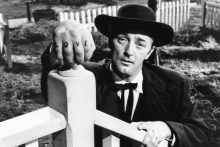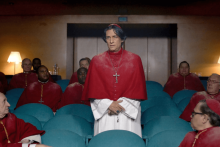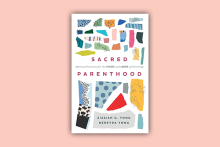Arts & Culture

So far, this escalating feud is a rather depressing back-and-forth, a cycle of violence for which there doesn’t seem to be any way out. But instead of letting us bask in Ellie’s righteous violence a la John Wick, the series questions the line between justice and revenge, asks whether mercy has any part in the equation, and doesn’t offer any easy answers to these reflections.

PANKAJ MISHRA OPENS The World After Gaza: A History with the 1943 Warsaw ghetto uprising in German-occupied Poland. The Jews imprisoned in the ghetto fought their Nazi captors for “a few desperate weeks” until they were crushed. Mishra quotes one of few survivors, Marek Edelman, who “was ‘terribly afraid’ that ‘nobody in the world would notice a thing,’ and ‘nothing, no message about us, would ever make it out.’”
The Israel Defense Forces’ ongoing destruction of Gaza following the Oct. 7, 2023, attack on Israeli civilians by Hamas has been livestreamed by journalists, mothers, and teenagers. Globally, many suffered “an inner wound,” Mishra writes, from watching these cruelties: Israel’s bombs targeting children, schools, and hospitals; military dogs mauling disabled Palestinians; and IDF soldiers denying starving people access to food. Despite Palestinian efforts to broadcast the war crimes, Gaza still burns. Mishra contrasts reactions to the atrocities in 1943 Warsaw and in Gaza today to explore Western state-sanctioned violence.
Although Western Allies pledged never to let the genocide of the Holocaust happen again — a promise that has defined Western morality for decades — the violence unleashed in World War II death camps has been repeated across the globe in Japan, Vietnam, Rwanda, Iraq, Syria, and Gaza.
Mishra, a British Indian writer, links the rhetoric of Israel’s ethno-state to the Hindu nationalism of his native India. From a Hindu Brahmin family, Mishra recalls his childhood admiration of Israel’s leaders and how he, and many other Hindu nationalists, admired their macho tactics.

SPARROW HAS EVERYTHING under control. They know which clothes their mom likes them to wear, what kinds of grades reflect well on the family, and what topics to never ever talk about with their mother. But one day the formula collapses and Sparrow’s mother gets in a car crash. Now they must live with a relative they have never met and know nothing about. Used to a life of moving around due to their mother’s struggles with addiction, Sparrow thinks they have the perfect formula for how to blend in at their new school, but soon new friends, a magical creature, and a series of personal revelations take the middle schooler out of their comfort zone to somewhere much more beautiful.
Ash Van Otterloo’s The Beautiful Something Else follows the journey of a preteen living in the South. Sparrow, who is unknowingly nonbinary (at least at the beginning of the novel), has long played the role of an adult. Because their emotionally unstable mom has surrounded Sparrow with so many carefully constructed rules, the young protagonist hasn’t been able to find out who they really are — gender identity included. When Sparrow is forced to move in with their Aunt Mags (their closest relative), they are suddenly living in the one place their mother never wanted them to go: their mother’s childhood home in Tennessee. But Aunt Mags has reclaimed the space, renaming it Rainbow House. The property, with its many trailers and main house, is a haven for mostly queer families and local college students.
As an agnostic person, I don’t often reach for religious language, but Rainbow House reminded me of the reign of God, a collective utopia with no more suffering. Led by a loving and welcoming queer community, Rainbow House is a place where people farm the land, protect wildlife, host community gatherings and festivals, and practice radical forgiveness and generosity.

Layperson’s Terms
Each week, The Bible for Normal People podcast offers deep cultural and historical context to scripture. Hosts Peter Enns and Jared Byas have challenging and engaging conversations with notable guests, including Richard Rohr and Amy-Jill Levine, on topics like biblical inerrancy and mental health. thebiblefornormalpeople.com

ECCLESIASTES 1:9 TELLS us “What has been is what will be, and what has been done is what will be done; there is nothing new under the sun.” I used to read that verse with a sense of existential fatigue, but as I’ve grown older, it reminds me that the struggles we face now are different forms of struggles as old as time itself. As hard as things might get, we’re never without hope that good will come back around, because it has before.
Examples of this exist in art as well as scripture. Take, for example, the 1955 film The Night of the Hunter, which addresses religious extremism, hypocrisy, and spiritual abuse. Director Charles Laughton’s dark and impressively modern approach to those ideas didn’t sit well with audiences at the time, but 70 years later, the film has only grown in influence.
Laughton’s film follows Harry Powell (Robert Mitchum), a Depression-era preacher who funds his “ministry” by marrying widows and killing them for their money. We watch Powell court, manipulate, and murder a guilt-stricken woman, Willa (Shelley Winters). Willa’s children, John (Billy Chapin) and Pearl (Sally Jane Bruce) escape Harry’s clutches and find refuge with Rachel (Lillian Gish), a kind woman who helps them recover from their trauma.

WHEN ANTONI GAUDÍ became the chief architect for Barcelona’s Sagrada Família Basilica in fall 1883, he had no illusions that he would live to see its completion. “There is no reason to regret that I cannot finish the church,” he said. “I will grow old, but others will come after me. What must always be conserved is the spirit of the work, but its life has to depend on the generations it is handed down to.”
After 142 years of construction, Gaudí’s masterpiece is slated to be finally completed in 2026, 100 years after Gaudí’s death. The finished basilica will have three distinct facades, only one of which was completed in Gaudí’s lifetime, and 18 towers — 12 for the apostles, four for the evangelists, one for the Virgin Mary, and the tallest and most central tower for Jesus. When you look at the Barcelona skyline from Park Güell, where the architect lived for almost 20 years, the basilica soars above the rest of the city, clothed in scaffolding. From far away, the cone-shaped, sand-colored spires look like intricate, naturally occurring stalagmites, reaching toward the heavens.
Gaudí’s iconic style — lots of curves, a heavy use of mosaic, and motifs from nature and Catalonia — was an extension of the broader artistic movement of Modernisme, the Catalonian cousin of Art Nouveau. Even though some of the visual language of the Sagrada Família had precedent in buildings such as the Castell dels Tres Dragons or the Palau de la Música Catalana, both by Lluís Domènech i Montaner, the basilica was still controversial. George Orwell once said that the Sagrada Família was “one of the most hideous buildings in the world,” and lamented that it hadn’t been destroyed during the Spanish Civil War. But more than a century later, Gaudí is widely recognized as an artistic genius, and his works have UNESCO World Heritage site status.
There are no exact right angles in the Sagrada Família’s design because Gaudí believed right angles didn’t occur in nature. Instead, you will find the spiral of a shell, the honeycomb structure of a beehive, the branches of a tree, and the unique curvature of a leaf. He also pioneered the mosaic technique known as trencadís, where pieces of ceramic or glass were broken into irregular shapes and applied to the surface of a form.

R.O. Kwon, the bestselling novelist of The Incendiaries and Exhibit, does not believe in God. Even so, Kwon’s writing about God and faith feels more familiar to me than that of many who do believe.
As someone who very strongly believes in God, I find that kinship feels a little scary and a little dangerous. To avoid too much psychoanalyzing, it makes it feel like the waters between belief and unbelief are rather porous. This line of thought is tempting to run from, as all scary things are, but it’s here that I return to Kwon’s work.

Conclave’s message goes beyond papal elections: Before I saw the film, I couldn’t have predicted just how shockingly relevant it would be to me and my experience as a trans person still doing my best to remain in relationship with the church.

Until recently, the young women at the forefront of conservative politics were largely evangelical Protestants. They looked like the kind of young women you might see showing their OOTDs on RushTok, marrying a certain Southern-bred feminine aesthetic with a defense of President Donald Trump. These young women aren’t fading into the background during the start of the second Trump administration, but they now have company. Young Catholic women have emerged as instrumental messengers of the MAGA message.

Money, ubiquity, and familiarity have blunted the radical force of Lucas’ original vision, so much so that it’s not unusual to see nostalgia-poisoned fans wistfully recalling his original trilogy as a time before “everything got so political.” But Cameron, always a fine student of sci-fi politics, notes that not only were Luke, Leia, and Han taking part in an explicitly political drama; they were fighting on the side most of the viewing public — at least in modern Western politics — would consider “the bad guys.”

n the Gospel of John, Mary Magdalene is the first person to see the risen Jesus. That means, in the brief, beautiful space between meeting the Lord and telling the disciples what she’d seen, Mary Magdalene was the whole entire church, giving rise to her identification as “the apostle to the apostles.”
“What an important and special thing for the first person to witness Jesus resurrected being a woman,” Elizabeth Tabish said. “Being one of his best friends, and for her to not turn away from the crucifixion, not run from it, but to stay there in witness of it. And then this beautiful reward of remaining with him to the point of seeing him resurrected. It’s just beautiful.”
Tabish plays Mary Magdalene in The Chosen, the historical drama series that turned the life of Jesus into prestige TV and against all odds became a commercial and critical smash.

Even if you haven’t seen Warfare, you might have come across news headlines calling it “the most realistic war film ever made.” This isn’t a cheap marketing ploy. The film, the latest from Ex Machina, Annihilation, and Civil War director Alex Garland, does indeed have a strong claim to that title. Garland’s first foray into cinematic nonfiction, Warfare is based on the memories of Navy SEAL soldiers who were ambushed by al-Qaida in the aftermath of the Battle of Ramadi in 2006.

Born Again opens by bringing back the central members of the Netflix series cast, including Charlie Cox as blind lawyer Matt Murdock, Elden Henson as his best friend and partner Foggy Nelson, and Deborah Ann Woll as his love interest and other partner Karen Page. Within minutes, they’re attacked by the super-assassin Bullseye (Wilson Bethel) and Matt changes into Daredevil to fight back. But he’s not quick enough to stop Bullseye from killing several innocents, including Foggy. After Matt tries to kill Bullseye in retaliation, he decides to put his vigilante days behind him and seek justice through the law instead of through fighting on rooftops.
To put it another way, Matt decides that vigilantism has failed and it’s time to put his faith in the law. Yet, each episode of Born Again has put that faith to the test — with decidedly mixed results.

Alissa Wilkinson, a movie critic at The New York Times and a Didion expert, is especially interested in how Hollywood continues to use such cliches when telling stories. Her newest book, We Tell Ourselves Stories: Joan Didion in the American Dream Machine, is an exploration of Didion’s writing in connection to the movie business and how her observations about Hollywood can help us interpret the current political landscape

“The problem with the meritocracy ... [is that it] leeches all the empathy out of your society.”
The right-wing political commentator Tucker Carlson said that back in 2017 and, by my lights, there’s a kernel of truth there. It almost echoes the early 20th-century sociologist Max Weber’s critique of the Protestant work ethic, how Americans are trained to see wealth as a just reward for living a good life and poverty as punishment for living a bad one; an economic spin on Calvinism. Even if you think Carlson is a reactionary grifter (which I do), I think he’s onto something here.

Sometimes kings raise a foundling —
it didn’t work out well for the Pharaoh —
but the opposite seems more typical.
Royals, gods, drop into the hands
of commoners. Gilgamesh, they say,
was hurled as an infant from a tower.
An eagle broke his fall; a gardener took him in.
Satyavati Kali, the female twin found in a fish
was handed back to the fisherman.
And there’s the Nazarene carpenter.
What happens to such parents? Do they win
a suite in the palace? Or do they remain at home,
fused to their roles: gardener, fisherman, carpenter,
rising early, low as dew on grass,
moving to their tasks, unchanged
by the glory they served,
set in their motions like planets,
pausing now and again in their labor
to be kissed by lapping waves,
to hear the grain of the wood
gently praising their name.

WHEN JEFF CHU left his New York City magazine job to enter seminary, he didn’t expect one of his academic assignments to be dismembering a chicken. But at Princeton Theological Seminary’s “Farminary” (read: part farm, part seminary), learning takes place in nontraditional ways.
In his new memoir, Good Soil, Chu writes about raising chickens, rejuvenating soil, and searching for meaning. His storytelling brings to life the 21-acre farm where Chu and his classmates try to learn what it takes to follow the example of Jesus, once mistaken for a gardener himself (John 20:15).
Chu’s award-winning journalistic prose translates seamlessly to memoir as he shares his experience as a mid-life seminarian. He captures detail in a way that invites readers to practically smell the radishes rotting in the compost bin and easily imagine the playful cast of seminarian farmhands Chu learns beside.
In the early days of Farminary classes, the professors challenge the students to “expect love to grow” alongside the fruits and vegetables. Chu feels skeptical. “I have good friends. I don’t need new friends,” he writes. It is a joy to see Chu’s disillusionment transform into relationship and his skepticism blossom into wonder.

THE DAY AFTER the presidential inauguration in January, Episcopal Bishop Mariann Edgar Budde, preaching at a prayer service for unity attended by President Donald J. Trump, warned members of the new administration that contempt is “a dangerous way to lead a country.” She pleaded for their mercy and compassion for the most vulnerable and outlined a vision for social healing founded on genuine “care for one another.” Budde’s words stand in stark contrast to the campaign of dehumanization and destruction we’ve witnessed since.
In the last few months, I’ve contemplated how, with incredible grace, Budde spoke truth to the power sitting before her in the pews. Her sermon left me feeling calm and convicted and brought to mind one of my favorite artists, the 19th-century impressionist Mary Cassatt. Like Budde’s sermon, Cassatt’s paintings are striking in their softness; they remind me of the kind of activist and person I want to be. I want to live with my heart softened and meet suffering with tenderness.
As Ruth E. Iskin explains in Mary Cassatt Between Paris and New York, Cassatt was “neither simply or completely a bourgeois, nor fully a precursor to the 1890s New Woman, but a mixture of both.” She was “anchored in a transatlantic network that included numerous conservative Americans” and an independent working woman who passionately supported women’s suffrage and full emancipation. In a male-dominated art scene, Cassatt made a name for herself with humanizing portraits of women of all ages, showing the relationship between caregivers and children and the dignity of motherhood. Her layered, emotionally vulnerable pieces highlighted the strength of women and the beauty and seriousness of care itself.
Her politics were characterized by a similar sensitivity. Iskin explains, “[Suffragists] claimed that the very role of mothers in the private sphere justified extending their activity into the public sphere of politics and government.” In other words, they made the case that the qualities of love, strength, and commitment exhibited by many women in their homes would also benefit civic spaces.

Parenting With Grace
Aizaiah and Nereyda Yong are married ministers and parents to four kids. In Sacred Parenthood, the authors break down “contemplative parenting,” offering simple practices parents can implement to be more intentional and present with their families. Herald Press
Soft Spaces
Liz Walker offers an intimate account of a Black church’s trauma-healing ministry, emphasizing the importance of sharing grief and providing “soft spaces” for healing. No One Left Alone reveals how vast pain can be transformed into hope and connection through the power of community. Broadleaf
Unconditional Love
In Queer & Christian, Brandan Robertson reclaims faith for LGBTQ+ Christians. Through accessible scholarly insight and personal narrative, he challenges the “clobber verses” of the Bible, celebrating queer saints and offering hope for anyone seeking inclusive spirituality. Macmillan
